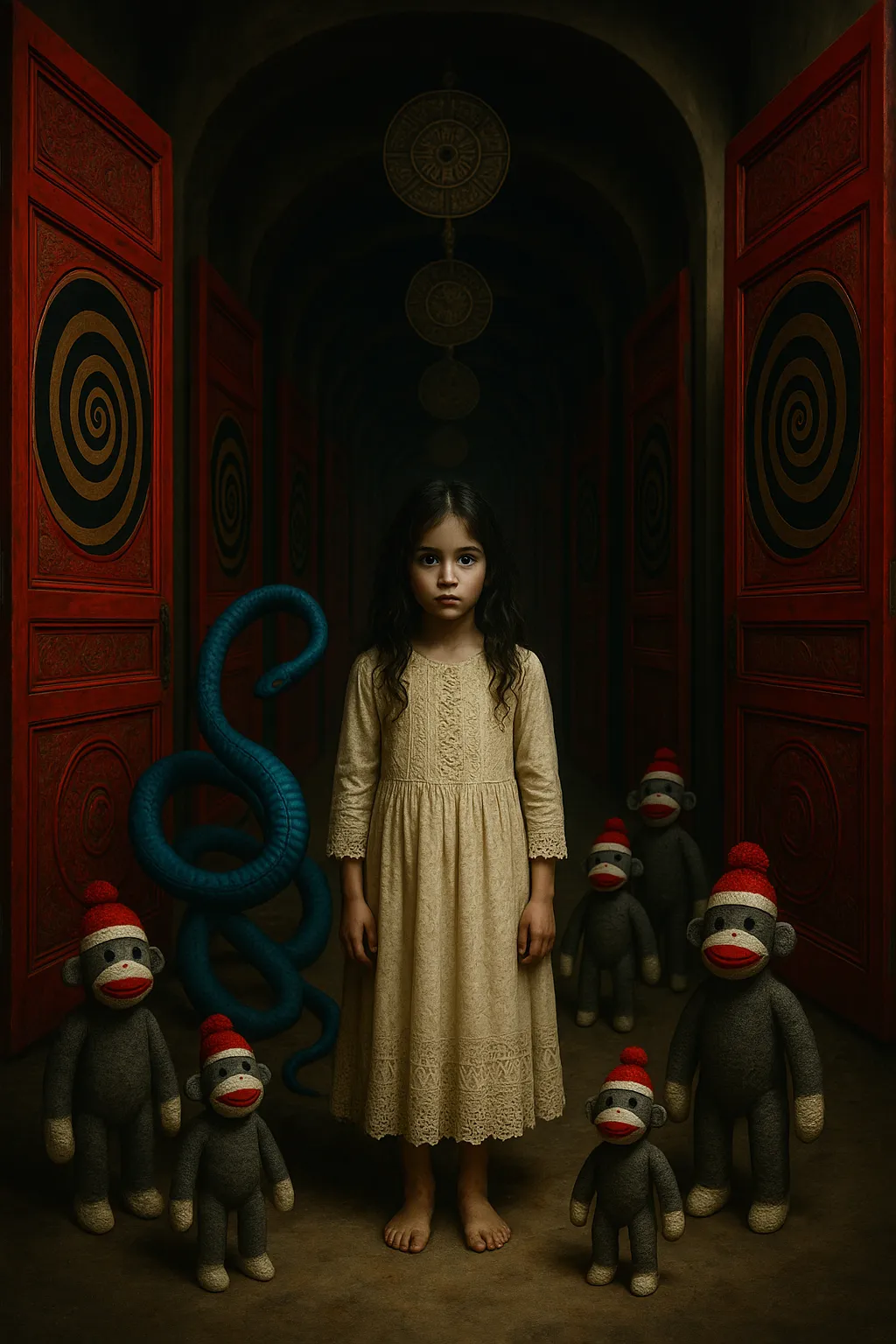Welcome To The
Self-Discovery Loop, Where the Loop Ends...
and the
Path Begins with You
A Journey from Childhood Trauma to Emotional Liberation.
We’re told that some children are born sensitive, that it’s innate, part of their wiring, untouched by environment. We’re also told that early childhood experiences can only amplify or suppress that sensitivity, like turning the volume up or down on something already there.
What They Told You Wasn't True.
I believe sensitivity isn’t something we’re born with; it’s something we absorb. It’s shaped by the field we’re raised in, long before we learn to speak. Before identity, there is energy. And what we call intuition, empathy, or psychic ability often begins as survival patterning.
If your experience mirrors mine, you were likely labeled emotionally intense or confrontational. When emotions dominate your interactions, you’re often told to let things go, stay positive, or shift your focus, advice that feels less like support and more like rejection. Like your emotional truth is too much for the room.
Curious if this is what shaped your sensitivity too?
Download my free resource guide:
The Field We Grew Up In, a case study on environmental absorption and psychic survival instincts.


Still stuck in the same loop, no matter how much you know?
Download my free PDF: The Mirror of the Wound , Why Empaths & Narcissists Aren’t Opposites… They're Reflections.
Hello, I am Rachel Nordahl. I’m a recovering starving artist turned legacy-minded truth teller. I’ve failed more than I’ve succeeded, but what I’ve learned along the way has more value than anything I could’ve planned.
I’ve worn many hats: wearable art designer, psychic, failed entrepreneur, somatic explorer, accidental restaurateur. What ties it all together is this: I’ve always been searching for what’s real underneath the performance. And now, I’m finally saying it out loud.
I don’t want to hustle. I don’t want to flex. I want to teach what I’ve lived, share what I’ve seen, and leave behind something honest that lasts.
Navigating the Complex Landscape of Relationships
In my formative years as a young woman, relationships felt like a perplexing maze. The so-called "experts" either over-intellectualized, bypassed emotion altogether, or oversimplified the complexity, leaving me questioning why I kept attracting unhealthy dynamics or couldn’t seem to leave them behind.
Self-help often dismisses these struggles as mere symptoms of low self-esteem, while spiritual gurus quickly assign blame, casting you as a victim and creating a new set of challenges. Whether oversimplified or overly complex, None of it ever really fit, too simple, too complex, never true to what I was actually living. I longed for a narrative where I felt seen, heard, and understood, a guide to creating lasting change that acknowledged the intricacies of my experiences.
If this sounds familiar, you may have been told that your relationship struggles stem from needing a "strong man" or that you're somehow special.
Regarding your sensitivity, you might have been labeled an Empath, naturally drawn to Narcissists who feed on your energy. This dynamic often leads to volatile, unbalanced relationships, leaving you reactive, dysregulated, and confused about who you’ve become. Despite the turmoil, you find it difficult to leave, feeling almost addicted to the person, even though the interactions leave you devastated.
When seeking answers, the internet is awash with scenarios that simplify these dynamics into archetypes of angels and demons, introducing the notion of Dark Empaths. This can add to the confusion, leaving you questioning if you fit into yet another label.
It Was Me the Whole Time
Why accountability felt like betrayal before it became my freedom.
If you’ve made it this far… you’re not just browsing anymore.

You’re not here by accident.
Watch: What the Sacred Rebellion Really Is
The Six Pillars of the Sacred Rebellion
There’s no one way through. No 10-step plan. But in every story I’ve lived, taught, or witnessed, these six truths always show up. This is the structure I return to when nothing else makes sense.
This isn’t a random sequence of lessons; it’s a calibrated re-entry map for building a self-sourced life. Each pillar builds on the last. Together, they form a complete recalibration of your identity, field, relationships, and future. Each pillar reveals a deeper layer of the work, not in linear steps, but in mirrors, rhythms, and patterns. This isn’t a checklist. It’s a reorientation. Here’s the journey you’ll walk:
The Magnetic Field
Understand how identity is shaped long before you have language.
You’ll uncover the origin of your attraction patterns, not in thoughts or beliefs, but in early theta state absorption. This is where we break the myth that you “manifested” your pain and instead map the environmental blueprint that created your field.
The Mirror of the Wound
See your relationships for what they really are, reflections of unresolved emotional survival strategies.
We deconstruct the empath-narcissist dynamic, projection patterns, and the repeating emotional loops in love. You’ll learn how to stop abandoning yourself in exchange for connection.
The Loop Of The Mind
Interrupt the autopilot running your emotional responses.
You’ll identify the subconscious trauma loops that hijack your nervous system, and begin reprogramming your response patterns using field-based recalibration, not mindset work.
The Language of symbols
Learn how to trust your own inner knowing without outsourcing.
Through intuitive pattern recognition, and symbolic literacy, you’ll train your perception to decode what your energy is already saying, before the mind even catches up.
The isolation chamber
Withdraw from external noise and re-center your field.
This is where real reinvention begins. You’ll implement solitude, no-contact, and controlled inputs to reset your vibrational baseline and build emotional stability without external validation.
The return to love
Choose relationships and paths from wholeness, not hunger.
This is the integration phase. You’ll rebuild your self-concept, choose aligned partnership, and step into emotional adulthood. Love becomes a conscious decision, not a need-based reaction.
What They’ve Felt Working With Me
"I’m so happy I found this guide. It’s not just beautiful, it’s deeply thoughtful. You can feel the time and care that went into it. If you’re just starting to learn tarot, this is the one to begin with. Clear, empowering, and stylish. I highly recommend it."
— Kerry H., Verified Amazon Purchase
"This is my second reading with her, and I keep coming back. She said there’d be a communication breakdown in my relationship, and it literally happened that same day. Her insight is always accurate, compassionate, and eerily spot-on. She reads energy like a mirror."
— Tarot Client, Myradale + Datgurl
The Truth Beneath the Work
I'm Not Here to Fix You, But I can Guide You Through Real Transformation
You’re looping. And everything you’ve called fate, personality, or pain...
was programmed by an environment you didn’t choose. At the core of The Self-Discovery Loop is one radical truth: You are not just the product of your thoughts. You are the sum of what you’ve absorbed. The mind doesn’t remember, it replays. And what it replays are unresolved emotional loops: Unintegrated memory fields encoded through trauma, repetition, and early adaptation.
Empaths and Narcissists are Not Opposites; they are mirror responses to the same origin wound. When together, they replay the story of childhood in real time: One absorbing, one deflecting. Both caught in the same unfinished loop. But the root of it all is not thought. It’s not even trauma. It’s environment. Environment is the Original Code. Emotion is the data carrier. And children in Theta state absorb it all, before they ever learn to separate who they are from what surrounds them.
This is where modern systems fall short: The DSM pathologizes your sensitivity but never integrates it. Psychology categorizes symptoms but doesn’t deconstruct the system that created them. The Law of Attraction oversimplifies energy as cause and effect. Spirituality bypasses pain by rebranding it as “gifts” and archetypes.
But here, we do it differently. We don’t fix you. We interrupt the field. We teach you to step out of the frequency that trained you to abandon yourself, and into the identity you were meant to construct on your own terms. Healing doesn’t begin in the mind. It begins in solitude, in new environments, and with the tools to recode what your nervous system never had permission to release. You're not here to be rescued. You're here to reclaim the loop and rewrite the self from the inside out.
Three truths I’ll never stop returning to.
(The deeper I go, the more they keep proving themselves true.)
The Loop of the Mind
The mind doesn’t move forward, it replays. Again and again. Until something interrupts the loop, it just keeps trying to finish the story. Every reaction, every trigger, every “why am I like this” moment is a fragment trying to be understood. Not fixed. Not fought. Just finally integrated. When you get this, you stop calling it self-sabotage. You start realizing: the past is still running the script, and your body’s just trying to survive it.
The Mirror of the Wound
The empath and the narcissist aren’t opposites. They’re reflections. Two sides of the same injury, the one that taught you love requires sacrifice. One absorbs. One deflects. But both are just reenacting a childhood wound that hasn’t found resolution. It’s not about blame. It’s about recognition. You’re not crazy. You’re just stuck in a loop that was never yours to begin with.
The Magnetic Field of Identity
You didn’t build your identity with thoughts. You absorbed it, in theta state, in chaos, in silence, in survival.
The field came first. And it taught you who you had to become in order to belong. But here’s the good news: If it was absorbed, it can be re-written. Not with affirmations. With full-body recalibration. The kind that makes your entire field start to say, “We don’t live like that anymore.”

Not All Who Wander Are Lost.
Step Into the Fire and Rise with Intention.
Welcome to The Sacred Rebellion!